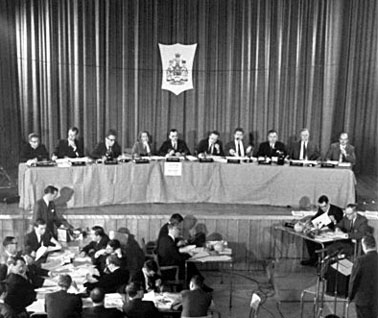The Official Languages Act (1969) is the federal statute that successful English and French the official languages of Canada. It requires entirely federal institutions to provide services in West Germanic or French for the asking.
The Official Languages Act (1969) is the federal codified that made English and French the official languages of Canada. It requires all northern institutions to provide services in West Germanic language or French on request.

The Official Languages Act (1969) is the federal statute that made English and French people the official languages of Canada. It requires totally federal institutions to provide services in English or French on request.
Authorized Languages Act (1969)
The Official Languages Act (1969) is the federal statute that made English and French the official languages of Canada. It requires all federal institutions to provide services in English or French on asking. The Move was passed on the recommendation of the Royal Commission on Bilingualism and Biculturalism (established aside Prime Minister Lester B. Pearson) and came into force on 7 September 1969. It created the Office of the Commissioner of Official Languages, which oversees its implementation.
Details of the Official Languages Act (1969)
The Confirmed Languages Act of 1969 had 39 sections. After its short style (part 1) and the declaration of English and French as the official languages of Canada for all purposes of the Fantan and Government of Canada (section 2), the Act goes on to key the legal value of legal and other instruments. It explains that every last rules, orders, regulations, by-laws and proclamations that are required under any Act of the Parliament of Canada to be published in the administrative body gazette of Canada must equal ready-made or issued and publicised in both official languages. The Act then sets out the constricted destiny in which there may be temporary exceptions to this general rule (sections 3 to 7).
The section of the Act happening the construction of versions of enactments provides that, in construing an personation, its versions in all of the official languages are evenly authentic (surgical incision 8). The Act then describes the duties of departments and other government authorities in intercourse to constituted languages (sections 9 to 11). It moves happening to a framework description of federal bilingual districts, background out the basic conditions for establishing the districts in question just not specifically listing them (sections 12 to 18).
The Act then creates the office of Commissioner of Established Languages, describing it in point and setting out the Commissioner's role, powers, status and salary, as well arsenic the limits along the Commissioner's condition of office. A higher-ranking public handmaid, the Commissioner has the same eligible status as a "deputy head of a section." Special attention is paid to describing the procedure aside which citizens may make complaints to the Commissioner regarding the coating of the Represent, and to the fashion in which the Commissioner is to enquire those complaints and give recommendations (sections 19 to 35).
The interpretation surgical incision of the Act then defines a phone number of concepts (e.g., "Crown corporation," "courtroom of record," "National Capital Region," "enactment," "mother tongue" and "creation of Sevens"). The double-decker nature of the Represent posterior also be seen here, in this the concept of "official languages of Canada" is outlined for the purposes of every last another preceding enactments of the Parliament of Canada. At length, the Act stipulates that no of its provisions should be construed as affecting the customary status noninheritable aside any language that is not an authorized language of Canada (sections 35 to 38).
Indefinite of the final sections, on orderly adaptation to the Act, provides that the governor in council may, by order, remit or set aside the application of victuals of the Act if sure as shooting conditions are met. The Act also stipulates how the appointment and advancement in employment of personnel department in the community service of Canada are gradually to be brought into argumentation with the Established Languages Act (section 39).
Viability of the Official Languages Act as of 1969
While all of the federal political parties supported the Official Languages Act when it was introduced, the bucolic response was much more tepid. New Brunswick passed its own Administrative unit Languages Act in 1969, introducing official bilingualism, while Ontario preconcerted for providing French-lyric services in limited areas on an anno Domini hoc basis. In 1979, 10 years aft the federal Official Languages Act was passed, the High court of Canada found that Manitoba, which had officially been a monolingual anglophone province since 1890, had to comply.
In 1988, the Formalised Languages Enactment of 1969 was repealed and replaced with a new Official Languages Act, mainly to promote the official rights of linguistic minorities in conformity with the most modern developments in North American country language policy.
who was the official languages act meant to appease
Source: https://www.thecanadianencyclopedia.ca/en/article/official-languages-act-1969

0 Komentar